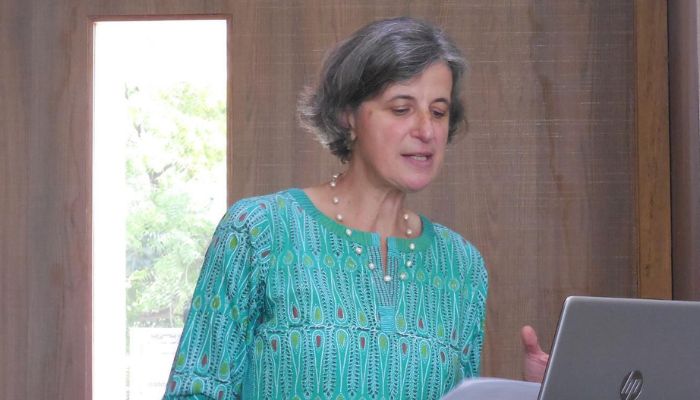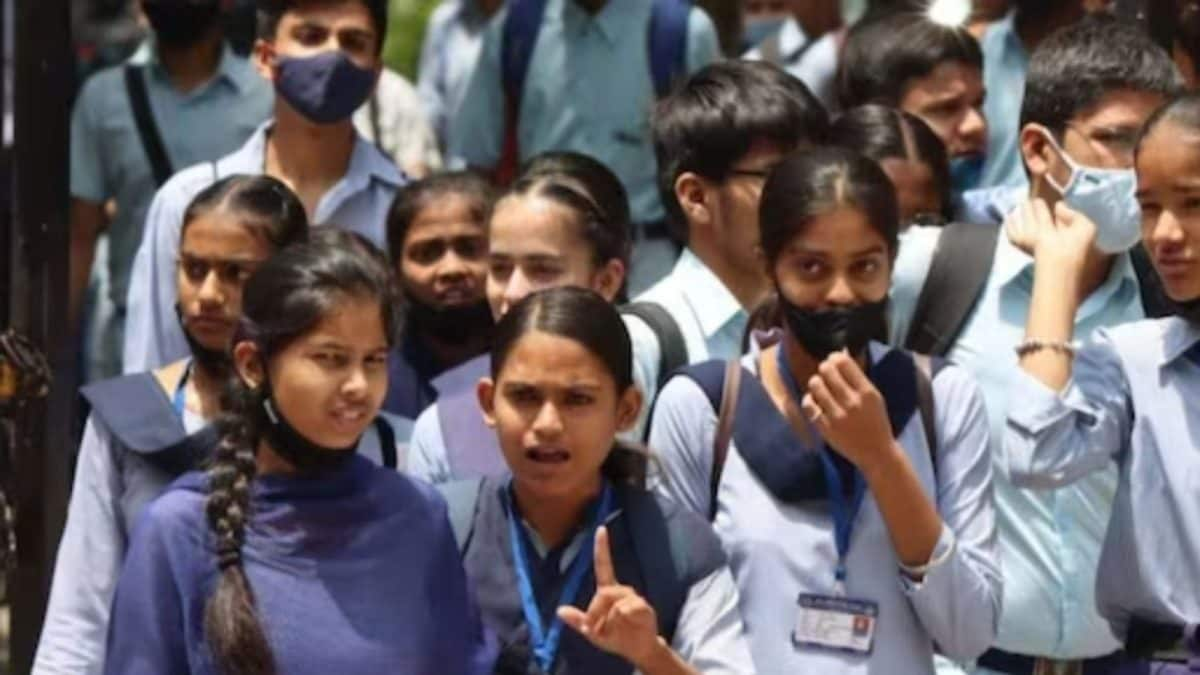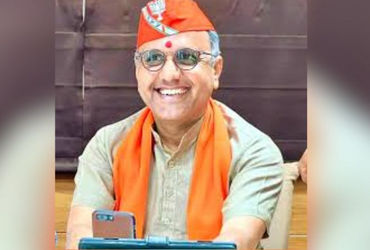Francesca Orsini, who rallied against CAA, was deported due to visa violations: Why the ‘liberal’ tears are merely propaganda
On 21st October, Francesca Orsini, a British academic known for her work on the Hindi language, was denied entry into India and deported from Delhi’s Indira Gandhi International Airport despite holding a valid five-year e-visa. As soon as she reached India, she was stopped by immigration officials and sent back to Hong Kong within hours. The incident sparked outrage in some left-leaning academic and political circles, and obvious actors published op-eds and social media posts criticising the government for the deportation without specifying the reason. The BJP-ruled central government was hounded for an “anti-academic” stance based on ideology. However, government sources later cleared the air, and reports emerged that Orsini was blacklisted in March 2025 itself for violating visa conditions. Her deportation, according to government sources, was a matter of routine enforcement, not ideological differences. But a deeper analysis of her ideology and thoughts about India and Hinduism, etc., needs to be scrutinised. Government followed law, not ideology The Ministry of Home Affairs has confirmed that Orsini had earlier visited India on a tourist visa, and during that visit, she engaged in unauthorised academic activity, which is a clear violation of visa norms. According to India’s immigration rules, tourist visas do not permit any form of professional work, research, or scholarly engagement. Official sources confirmed that this breach was the reason for her blacklisting. Once flagged, the system automatically denied her entry, irrespective of the validity of the visa. The confirmation from the ministry made it clear that it was not a targeted action. There was no last-minute policy change, and no “political conspiracy”, as the left-leaning media houses and individuals have been claiming. It was just standard visa enforcement, which applies equally to any foreign national, regardless of profession or ideology. The fact that Orsini chose to ignore or sidestep these conditions is what led to her being denied entry. During the research, OpIndia found that Orsini has a long history of anti-Hindu and anti-Indian establishment stands. Despite her history, she was allowed until March this year to visit India, which clearly shows that there was no ideological reason behind the ban. Anti-CAA stance, targeting govt over Kashmir and academic posturing Francesca Orsini is being projected as an apolitical scholar, which she is not. She was part of a group of academics who publicly condemned Indian police actions during the anti-CAA protests and accused the Government of India of sectarianism. Orsini has consistently aligned herself with left-liberal narratives critical of Indian policy and governance. Coming to her views on Kashmir, in March 2016, she was among 150+ signatories worldwide who signed an open letter against the so-called “vilification” of pro-Naxal professor Nivedita Menon. At that time, Menon had faced a media furore after a JNU teach-in where she questioned India’s stance on Kashmir’s political status. Orsini co-signed the solidarity statement and condemned the “vicious right-wing media campaign” branding Menon as “anti-national” for her views on Kashmir. The letter defended academics’ freedom to discuss Kashmir and urged JNU’s administration to protect her right to speak. Apart from activism, Orsini has repeatedly shown her ideological tilt in her writings. For example, in a 2002 essay, she referred to the Ramayana and Mahabharata as “amoral” texts and contrasted them unfavourably with modern liberal literature. She highlighted with disapproval that figures like Bhagwan Ram could no longer be freely criticised in India of that time. Notably, Bharatiya Janata Party was the ruling party at the Centre under the NDA at that time. In Orsini’s chapter titled “Na Turk Na Hindu” in the book ‘A Multilingual Nation: Translation and Language Dynamic in India’, she went after the linguists and accused them of communalising languages. While she tried to raise alarm over a fictious theory, she ended up doing the very thing she warned against that is stitching together her own “Hindi-Hindu-Hindustan” bogeyman and passed it off as historical critique. She wrote, “Modern language ideologies firmly believe that languages “belong” to specific communities, be they ethnic, regional, or religious. These imagined communities, Benedict Anderson has taught us (1991), get simultaneously projected in the past, present, andfuture. In the late-nineteenth and early-twentieth centuries the slogan “Hindi-Hindu-Hindustan” projected Hindi (in the Nagari script) as the language of Hindus in north India “from the beginning”, urged contemporary north Indian Hindus to embrace it, and claimed that Hindi would become the national language of all Indians, explicitly coded as Hindus.” She added, “This modern imaginationforged a continuum of script-language-community in the face of long histories of multi-



On 21st October, Francesca Orsini, a British academic known for her work on the Hindi language, was denied entry into India and deported from Delhi’s Indira Gandhi International Airport despite holding a valid five-year e-visa. As soon as she reached India, she was stopped by immigration officials and sent back to Hong Kong within hours.
The incident sparked outrage in some left-leaning academic and political circles, and obvious actors published op-eds and social media posts criticising the government for the deportation without specifying the reason. The BJP-ruled central government was hounded for an “anti-academic” stance based on ideology.
However, government sources later cleared the air, and reports emerged that Orsini was blacklisted in March 2025 itself for violating visa conditions. Her deportation, according to government sources, was a matter of routine enforcement, not ideological differences. But a deeper analysis of her ideology and thoughts about India and Hinduism, etc., needs to be scrutinised.
Government followed law, not ideology
The Ministry of Home Affairs has confirmed that Orsini had earlier visited India on a tourist visa, and during that visit, she engaged in unauthorised academic activity, which is a clear violation of visa norms. According to India’s immigration rules, tourist visas do not permit any form of professional work, research, or scholarly engagement. Official sources confirmed that this breach was the reason for her blacklisting. Once flagged, the system automatically denied her entry, irrespective of the validity of the visa.
The confirmation from the ministry made it clear that it was not a targeted action. There was no last-minute policy change, and no “political conspiracy”, as the left-leaning media houses and individuals have been claiming. It was just standard visa enforcement, which applies equally to any foreign national, regardless of profession or ideology. The fact that Orsini chose to ignore or sidestep these conditions is what led to her being denied entry.
During the research, OpIndia found that Orsini has a long history of anti-Hindu and anti-Indian establishment stands. Despite her history, she was allowed until March this year to visit India, which clearly shows that there was no ideological reason behind the ban.
Anti-CAA stance, targeting govt over Kashmir and academic posturing
Francesca Orsini is being projected as an apolitical scholar, which she is not. She was part of a group of academics who publicly condemned Indian police actions during the anti-CAA protests and accused the Government of India of sectarianism. Orsini has consistently aligned herself with left-liberal narratives critical of Indian policy and governance.
Coming to her views on Kashmir, in March 2016, she was among 150+ signatories worldwide who signed an open letter against the so-called “vilification” of pro-Naxal professor Nivedita Menon. At that time, Menon had faced a media furore after a JNU teach-in where she questioned India’s stance on Kashmir’s political status.
Orsini co-signed the solidarity statement and condemned the “vicious right-wing media campaign” branding Menon as “anti-national” for her views on Kashmir. The letter defended academics’ freedom to discuss Kashmir and urged JNU’s administration to protect her right to speak.
Apart from activism, Orsini has repeatedly shown her ideological tilt in her writings. For example, in a 2002 essay, she referred to the Ramayana and Mahabharata as “amoral” texts and contrasted them unfavourably with modern liberal literature. She highlighted with disapproval that figures like Bhagwan Ram could no longer be freely criticised in India of that time. Notably, Bharatiya Janata Party was the ruling party at the Centre under the NDA at that time.
In Orsini’s chapter titled “Na Turk Na Hindu” in the book ‘A Multilingual Nation: Translation and Language Dynamic in India’, she went after the linguists and accused them of communalising languages. While she tried to raise alarm over a fictious theory, she ended up doing the very thing she warned against that is stitching together her own “Hindi-Hindu-Hindustan” bogeyman and passed it off as historical critique.
She wrote, “Modern language ideologies firmly believe that languages “belong” to specific communities, be they ethnic, regional, or religious. These imagined communities, Benedict Anderson has taught us (1991), get simultaneously projected in the past, present, and
future. In the late-nineteenth and early-twentieth centuries the slogan “Hindi-Hindu-Hindustan” projected Hindi (in the Nagari script) as the language of Hindus in north India “from the beginning”, urged contemporary north Indian Hindus to embrace it, and claimed that Hindi would become the national language of all Indians, explicitly coded as Hindus.”
She added, “This modern imaginationforged a continuum of script-language-community in the face of long histories of multi-scriptual and multilingual practices in which languages have commonly been written in more than one script and people learnt more than one language and knew how to navigate a multilingual social world,” framing the Hindi–Hindu–Hindustan slogan as a deliberate nationalist reordering of complex, plural linguistic realities.
Liberal outrage follows a familiar script
The moment her deportation hit headlines, the usual names rushed to outrage. What none of them addressed was the simple legal reality: Orsini violated visa rules and was treated like anyone else would be in such a case.
Siddharth Varadarajan, founding editor of The Wire, a propaganda-filled news portal that broke the news of her deportation, questioned why she was deported for doing research during her last visit. He claimed that since she is a professor of Hindi, why should she not speak to people in Hindi or meet friends who are Hindi scholars. While he was whitewashing the violation of visa norms, he conveniently omitted the fact that she had entered on a tourist visa, not a work visa, which is what she should have applied for if she intended to conduct any “research”.
Journalist Kunal Purohit called it a “national shame” and claimed she has done “Hindi language than the petty-minded establishment that sees her as a threat”.
Francesca Orsini is a scholar who has done more for Hindi language than the petty-minded establishment that sees her as a threat.
— Kunal Purohit (@kunalpurohit) October 22, 2025
For #HPop, I relied on her scholarship for the study of nationalist poetry.
This is a national shame. pic.twitter.com/t87mo2HmFh
Rajdeep Sardesai said, “IRONY: a govt that claims to promote Hindi deports a leading academic who has researched Hindi all her life!”
Story that caught the eye: globally renowned UK based scholar of Hindi deported. IRONY: a govt that claims to promote Hindi deports a leading academic who has researched Hindi all her life! https://t.co/YX3zEttuG3
— Rajdeep Sardesai (@sardesairajdeep) October 22, 2025
Ramachandra Guha called the government “insecure, paranoid, and even stupid” for deporting her.
Professor Francesca Orsini is a great scholar of Indian literature, whose work has richly illuminated our understanding of our own cultural heritage. To deport her without reason is the mark of a government that is insecure, paranoid, and even stupid.https://t.co/j5Fz1uOphS
— Ramachandra Guha (@Ram_Guha) October 21, 2025
Propagandist, former journalist and TMC MP Sagarika Ghose wrote, “Shocking and sad. Francesca Orsini is a world renowned scholar of South Asian literature and Hindi who has been deported despite her valid visa. The narrow-minded and backward looking Narendra Modi regime is destroying the open-minded scholarship and excellence India has always stood for.”
Shocking and sad. Francesca Orsini is a world renowned scholar of South Asian literature and Hindi who has been deported despite her valid visa. The narrow-minded and backward looking @narendramodi regime is destroying the open-minded scholarship and excellence India has always… https://t.co/v5ezSCK5Ia
— Sagarika Ghose (@sagarikaghose) October 21, 2025
These reactions are not about protecting academic freedom, they are about pushing a narrative. A narrative that seeks to paint every immigration check, every enforcement of law, as an act of oppression. The outrage is selective, the facts ignored, and the intent clear, that is, to weaponise isolated incidents to vilify a government they politically oppose.
Not the first and not a special case
Orsini is not the only foreign scholar to face consequences for visa misuse or an anti-India stance. Filippo Osella and Nitasha Kaul were also denied entry in recent years after they were found to have violated Indian regulations. In all such cases, the enforcement has followed due process. Yet, every time, it is presented as part of a mythical campaign against dissent.
India, like any sovereign country, has the full right to enforce its immigration policies. It does not owe automatic entry to those who disregard the rules, regardless of whether they quote Sanskrit texts to twist their meanings or publish papers on Hindi fiction. That Orsini is a “respected academic” does not grant her a free pass to violate visa norms, enter under false pretences, and then claim victimhood.
Facts matter more than feelings
Francesca Orsini was not deported because of her criticism of CAA or her academic views on Hindu texts. She was deported because she allegedly broke the terms of her visa, plain and simple. The liberal outrage that followed was not based on the facts, but on a compulsive need to politicise administrative decisions. In the end, it is not the Indian government but its critics who are undermining due process by spinning a legal issue into an ideological spectacle.
The real question is not why Orsini was deported. It’s why her defenders think she should not be held to the same legal standards as everyone else.
































































































































